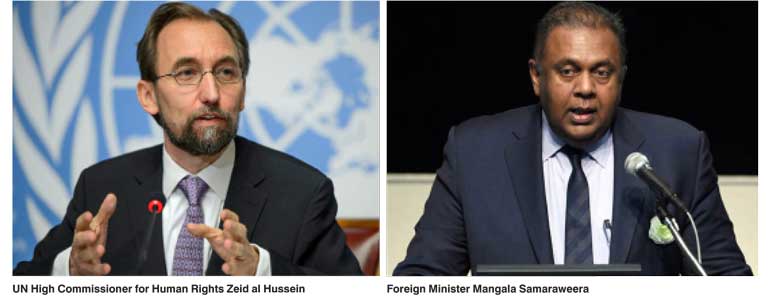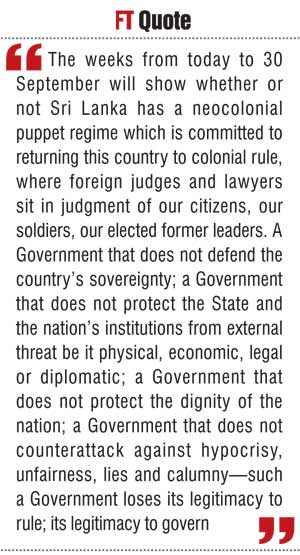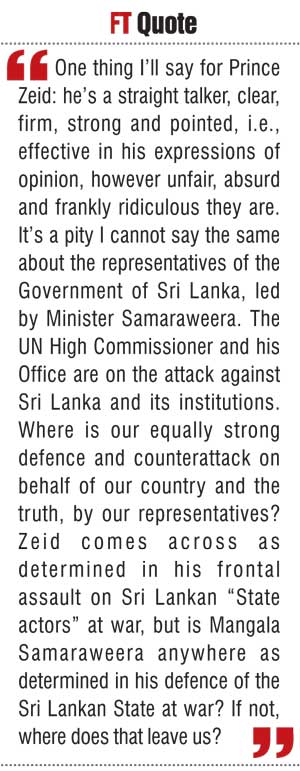Thursday Feb 19, 2026
Thursday Feb 19, 2026
Friday, 18 September 2015 00:00 - - {{hitsCtrl.values.hits}}

 Zeid Al Hussein and the Office of the UN High Commissioner for Human Rights have declared open season on our country. The single most dangerous thing about his report is the utterly outrageous recommendation to the United Nations system and all member states of the United Nations, i.e. 193 countries, to initiate investigations and prosecutions against Sri Lankans under the doctrine of universal jurisdiction.
Zeid Al Hussein and the Office of the UN High Commissioner for Human Rights have declared open season on our country. The single most dangerous thing about his report is the utterly outrageous recommendation to the United Nations system and all member states of the United Nations, i.e. 193 countries, to initiate investigations and prosecutions against Sri Lankans under the doctrine of universal jurisdiction.
Recommendation No. 36 on page 251 of the Report, addressed to “The United Nations system and Member States” urges that “whenever possible, notably under Universal Jurisdiction, investigate and prosecute those allegedly responsible for violations, such as torture, war crimes or crimes against humanity”. Thus, Zeid al Hussein hopes to launch a legal lynch mob and wage global legal war—total ‘lawfare’—against Sri Lanka.
One thing I’ll say for Prince Zeid: he’s a straight talker, clear, firm, strong and pointed, i.e., effective in his expressions of opinion, however unfair, absurd and frankly ridiculous they are. It’s a pity I cannot say the same about the representatives of the Government of Sri Lanka, led by Minister Samaraweera. The UN High Commissioner and his Office are on the attack against Sri Lanka and its institutions. Where is our equally strong defence and counterattack on behalf of our country and the truth, by our representatives? Zeid comes across as determined in his frontal assault on Sri Lankan “State actors” at war, but is Mangala Samaraweera anywhere as determined in his defence of the Sri Lankan State at war? If not, where does that leave us?

When you have an aggressive prosecuting attorney on one side and a passive defence attorney on the other, then you have a client who is in serious trouble. That’s Sri Lanka’s position at the UN in Geneva today. On the one hand there is UN High Commissioner for Human Rights, Zeid al Hussein’s strong aggressive attack on Sri Lanka in his remarks introducing the report issued by his office. On the other there is the pre-emptive sellout by the Sri Lankan Government represented by Minister of External Affairs Mangala Samaraweera.
Zeid Al Hussein himself admits in his opening remarks and in the Q&A that followed, that the Report is an exercise that has been done “for the first time”; that it is “rather unique”; that it is the first of its kind on human right violations by his Office. In this at least he is honest.
The obvious question is why on earth should Sri Lanka submit to or comply with an unprecedented procedure? Why should our country go along with the product of a process that states which have committed infinitely vaster horrors for much greater periods of time and repeatedly, have not? Why should we be the first in line? Why should we be the guinea-pigs? Why should we put our heads on a chopping block as no one else has? Why should the Sri Lankan Government, State and people submit to this discrimination; this institutional and diplomatic apartheid?
There is no pretence of even-handedness in Prince Zeid. In his opening remarks he spoke of crimes committed by the Sri Lankan State and “not only by State actors but also by the LTTE”. So the LTTE are merely an “also ran” in the list of those culpable. Zeid implicitly rules out the possibility that the alleged crimes were committed by individuals in the heat of passions such as revenge; he rules out that these are aberrations, when he says that there was clear planning at institutional and command level.
Prince Zeid accuses the Sri Lankan State of “international crimes”, i.e. of “crimes of interest to the international community…war crimes, crimes against humanity”. He accuses us of “indiscriminate shelling” and “sexual violence”. We have an answer readily at hand: the reports of Sir Desmond de Silva QC and his colleagues, who were the internationally renowned experts advising the Paranagama Commission. While their report should be immediately tabled in Geneva,  they could also be asked to draft our response to the OHCHR report.
they could also be asked to draft our response to the OHCHR report.
The game that is going on is clear. It’s the old one of good cop, bad cop. Zeid plays the bad cop and demands that our collective head be cut off. The Americans will come in and play the good cop, saying, no, we shan’t take the rap for trying to cut their heads off ; we’ll just ask the Sri Lankans themselves to fall on their sword or commit ritual hara-kiri.
Mangala Samaraweera has already agreed to the deal which is why he spoke of new statutes for a special criminal justice mechanism with a ‘Special Counsel’ (read Prosecutor). What is it that the existing laws and institutions cannot do? What is that would require new statutes and legal structures for ‘criminal justice’ and ‘accountability’? The only possible answer is the presence of a foreign component; foreign involvement in the domestic legal process!
The Sri Lankan Ministry of External Affairs has already indicated that it will agree to a consensual resolution to be moved by the USA at the UNHRC on 30 September. This would mean that Sri Lanka will agree to a hybrid mechanism with foreign involvement, but under the guise of a ‘domestic mechanism’ to be set up by new legislation.
The ‘consensus resolution’ formula will mean that Sri Lanka’s friends and those states who would be opposed to this model because of the violation of sovereignty that it entails and the dreadful precedent it sets , would be pre-emptively silenced. Not only will they be unable to speak up for us, they will be unable to speak up for a principle which is in their own interests simply because Sri Lanka will be used as a willing human shield by the US.
While Zeid’s example in the Q&A about the prosecution of former president of Chad does indicate that Mahinda Rajapaksa is indeed a target, his entire presentation shows that the primary target is the Sri Lankan State and armed forces and the war itself—our war of liberation from terrorism and for the reunification of our country. His target is nothing other than history—the verdict of history on the Sri Lankan State, its armed forces and our victorious war. The target is our self-pride as a society; our pride in ourselves as a country and people that defeated a ferocious terrorist army.
Zeid and his office have provided ammunition for generations the world over, to vilify Sri Lanka. Their discourse and Report gives the pro-Tiger diaspora the argument that their beloved Prabhakaran lost only because the Sri Lankan armed forces waged a war replete with war crimes. This is the worst possible reviling of the reputation of our dead heroes and their sacrifices—not least of those who gave their lives to breach the bunker-bund complex of the LTTE and save hundreds of thousands of civilians.
The weeks from today to 30 September will show whether or not Sri Lanka has a neocolonial puppet regime which is committed to returning this country to colonial rule, where foreign judges and lawyers sit in judgment of our citizens, our soldiers, our elected former leaders. A Government that does not defend the country’s sovereignty; a Government that does not protect the State and the nation’s institutions from external threat be it physical, economic, legal or diplomatic; a Government that does not protect the dignity of the nation; a Government that does not counterattack against hypocrisy, unfairness, lies and calumny—such a Government loses its legitimacy to rule; its legitimacy to govern.
[Dr. Dayan Jayatilleka was Sri Lanka’s Ambassador/Permanent Representative to the United Nations, Geneva 2007-2009 and a Vice–President of the UN Human Rights Council 2007-2008]